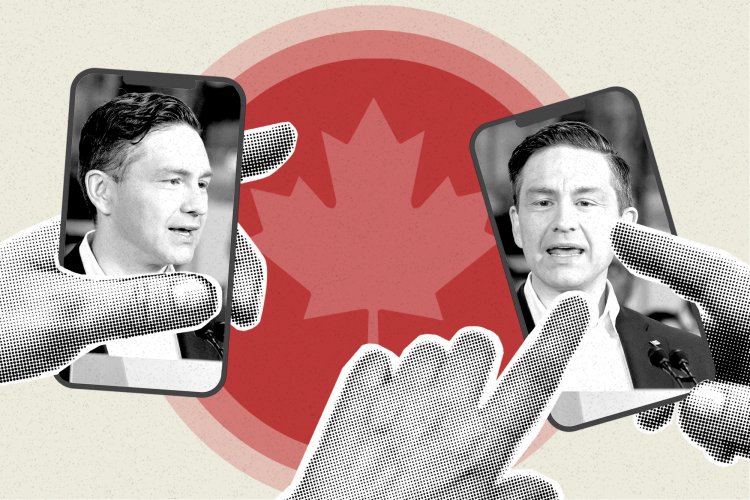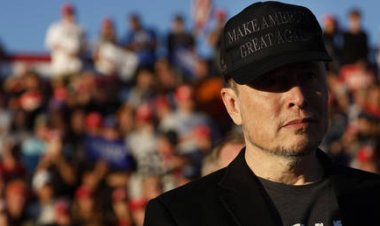Pierre Poilievre’s Top Asset Has Become a Significant Burden
The Canadian Conservative leader gained prominence through a media strategy reminiscent of Donald Trump's approach. However, that tactic is no longer serving him well.

This aggressive move was part of a political strategy designed for the social media era: maintain an offensive posture, avoid retreat, communicate directly and frequently with supporters, and encourage viral content. Additionally, Poilievre has effectively used traditional media as a foil in his pursuit of the prime ministership. While his methods have Canadian-specific nuances, they echo Donald Trump’s bold and persistent criticisms of mainstream media in the United States.
For a period, this approach yielded significant results. Poilievre managed to garner extensive media coverage and frequently went viral, both in Canada and internationally, particularly through his confrontations with journalists. This strategy resonated with U.S. conservative influencers who, until then, had not looked north for inspiration but recognized a similar ethos. By January, Poilievre’s unrelenting critiques, alongside mounting dissatisfaction with then-Prime Minister Justin Trudeau, helped elevate the Conservatives to a commanding nearly 25-point lead over the Liberals.
However, the situation shifted dramatically over the past three months, as the Liberals overtook the Conservatives in the polls. This change is largely attributed to Canadians' backlash against Trump’s unyielding economic and rhetorical assaults on their country. Consequently, Poilievre now finds himself distancing from any connection to the MAGA movement and his American conservative supporters. Despite efforts to establish policy distinctions between himself and Trump ahead of the April 28 election, he has retained his confrontational stance towards the media. This awkward adjustment has not yet addressed his declining poll numbers, as the same attitude that propelled Poilievre’s rise is now undermining his electoral prospects.
“The kind of aggressive, personal language that Trump uses to attack Canada is the kind of language and the tone that Poilievre uses as well,” notes Greg Elmer, a professor at Toronto Metropolitan University who studies the impact of social media on political communications and campaigns. “He’s still struggling to find language which separates him from what we’re hearing Trump say. That’s really the rub.”
Poilievre has been a member of Parliament since 2004 and was often labeled an “attack dog” during his tenure, winning the Conservative leadership election in 2022. His visibility among American conservatives increased significantly in 2023 after a video of him nonchalantly eating an apple while deftly handling a reporter went viral.
A significant part of that exchange involved Trump: “A lot of people would say that you’re simply taking a page out of the Donald Trump book,” remarked Don Urquhart, editor of the Times Chronicle. Poilievre quickly questioned, “Really, which people would say that?” Urquhart's reply faltered, which allowed Poilievre to mock him for not being able to name anyone: “Some people say,” he finished, turning the interaction into a piece of viral content. His campaign even published the unedited video on X, where it amassed 1.5 million views, generating tens of millions more through shares by other influencers.
Since early 2022, Poilievre has embraced anti-elite and anti-government overreach policies, notably when he supported truckers protesting vaccine mandates by distributing coffee and doughnuts to them in Ottawa. He frequently criticizes "gatekeepers" stifling Canadian industry and red tape. With the slogan “Canada First,” alongside pointed attacks on the CBC, Poilievre has drawn stylistic parallels to Trump, including comments from Conservative Alberta Premier Danielle Smith, who stated in March that “the perspective that Pierre would bring would be very much in sync with, I think, the new direction in America.”
However, while Poilievre's policies never gained significant traction in U.S. conservative circles the way his viral video did, remarks from American figures like Musk show he had gained attention. “Never heard of him before, but this interview is [fire emoji], [fire emoji], [laughing emoji],” Musk tweeted ironically, months after he endorsed labeling the CBC as “government-funded media.” Megyn Kelly asked, “Can we get him in our country?” Conservative commentator Matt Walsh remarked that “Republican politicians in this country should take note” of Poilievre’s viral clash with the journalist. However, the previously beneficial relationship between Poilievre and U.S. conservatives has now become detrimental. Many Canadians from across the political spectrum have reacted against Trump’s hostile tariffs and derogatory comments about Canada potentially becoming the 51st state. Consequently, “Canada First” has come to symbolize a rejection of Poilievre's associations with Trump.
“[Poilievre] made the choice to move the party over to the more populist far-right, which has adopted some Trump kind of discourse and political communication strategies,” Elmer commented.
Intriguingly, the American Trump-aligned right holds mixed views regarding Poilievre, as they see him as a traditional, Bush-era conservative likely to diverge from their stances on global trade or NATO involvement. In recent weeks, Poilievre has attempted to clarify his distance from Trump. “The president said that having a Liberal prime minister would be easier for him to deal with, just as he threatened once again to make us the 51st state,” Poilievre noted in mid-March. “On that point, it’s true: I’m a strong leader, a tough guy to deal with. I’m firm in my convictions, and I’ll always put Canada first.”
Despite continuing to adopt an aggressive approach towards mainstream Canadian media—barring reporters from his campaign plane and restricting certain CBC journalists from asking questions—tensions have escalated. A physical altercation between a Conservative Party staff member and a photographer occurred at a Poilievre event in Newfoundland in early April.
The Poilievre campaign did not respond to requests for comment, and multiple Conservative-affiliated political consultants declined to participate in interviews, with one inadvertently sending an internal email questioning whether an on-the-record discussion would be “worth the risk.” Poilievre's media criticisms are paired with a carefully managed media strategy specifying who has access and when.
“[The idea was], we want the prick,” noted Zain Velji, a former NDP campaign strategist and current partner at the consultancy Northweather. He explained that while Trudeau was often perceived as self-aggrandizing—fair criticism depending on one's political stance—the political climate has shifted dramatically. “What was once an asset is now a liability [for Poilievre].”
Polling data reveals that although Conservatives have declined from their peak in late January, the Liberals’ recent gains largely stem from the erosion of NDP support and, to a lesser degree, the Bloc Québécois. Many Canadians on the left are rallying behind Mark Carney, the new Liberal leader. Consequently, while Poilievre's campaign continues to resonate with core supporters, it has not translated into broader Conservative support or halted the Liberals’ upward movement. Unlike Poilievre, former Conservative Prime Minister Stephen Harper also had a strained relationship with the CBC, but Poilievre has escalated that strategy.
“The media and politicians are in this symbiotic relationship. They need each other and they hate each other,” explained Tamara Small, a political science professor at the University of Guelph who studies Canadian politicians' use of digital technologies. “The difference now is that you have a very potent alternative media that you can use with social media. The ads, the YouTube channel, you can still be on Jordan Peterson’s podcast.”
After years of leveraging this strategy with notable success, Poilievre currently finds himself facing significant challenges. He risks losing what once seemed to be a strong lead, partly due to his failure to adapt to the shifting political atmosphere in the United States and to distance himself adequately from the American conservatives who continue to praise his leadership.
Experts like Elmer, Velji, and Small contend that Poilievre’s current political struggles do not negate the overall effectiveness of his approach. The concept of dominating social media and challenging the mainstream media remains politically advantageous. While Trump may overshadow this election, that dynamic may not persist indefinitely in Canadian politics.
“Should the Liberals win, what this election proves is that there was a perfect storm,” Velji remarked. “Don’t fool yourself around the power and the potency of what these folks are doing, the effectiveness of what they’re doing. Regardless of your moral outrage… there’s something happening, even if the outcome is not a Pierre Poilievre government.”
Aarav Patel for TROIB News












